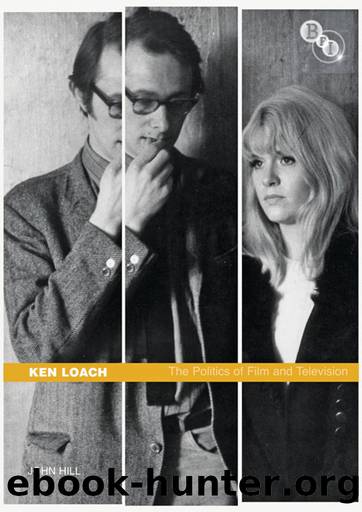Ken Loach: The Politics of Film and Television by John Hill

Author:John Hill [Hill, John]
Language: eng
Format: epub
Tags: Performing Arts, Film, History & Criticism, General
ISBN: 9781838716592
Google: h1jyDwAAQBAJ
Publisher: Bloomsbury Publishing
Published: 2019-07-25T00:00:16.469523+00:00
A âtypicalâ case study? Janice (Sandy Ratcliff) in Family Life
It is worth noting, however, how the argument about ânaturalismâ has now slightly shifted ground. In his original anti-naturalist polemic, âNats Go Homeâ, Troy Kennedy Martin had clearly identified ânaturalismâ with the theatricalism and temporal simplicities of television studio drama. However, Loachâs work, now shot on film on location and then carefully edited, no longer constituted the kind of straightforward televisual ânaturalismâ that Kennedy Martin had in mind. To this extent, Loachâs ânaturalismâ could now be said to be of a different order: one that is identified much more with the observation of surface, empirical realities (and avoidance of self-reflective techniques). Indeed, one of the peculiarities of the responses to Kennedy Martinâs original manifesto had been Garnettâs invocation of the leading exponent of literary naturalism, Ãmile Zola, in support of the supposedly anti-naturalist cause in television.387 In this respect, Kennedy Martinâs somewhat confusing call for ânew kinds of objectivenessâ may be seen to have sown the seeds of two divergent approaches: the cultivation of the detached, intellectual âobjectivityâ afforded by Brechtian and other modernist devices and the observational âobjectivityâ (or ânaturalismâ) that the use of film (and particularly shooting on location) could provide. While, in Diary of a Young Man, the âobservationalâ aspects of the drama remain subordinate to the programmeâs dominant modes of self-conscious narration and montage, this, as has been seen, soon changes in Loachâs subsequent work as formally obtrusive devices are gradually invested with a âdocumentaryâ motivation or eliminated altogether.
While this move in the direction of greater ânaturalismâ partly grew out of a concern simply to show the actualities of peopleâs lives, it was also motivated by a specific sense of a textâs relationship with the audience. Responding to McGrath and Wollenâs criticisms of his work, Loach commented that one of the things that had been central to the films heâd made was
to try to make films for the class which we think is the only politically important class â the working class â and therefore not to make elitist films, or cineaste films, but to make films which can be understood by ordinary people.388
For Loach, this also meant that he had to work with âthe expectationsâ that people brought to films and avoid erecting âa barrier between you and them by adopting a form they will react againstâ.389 In this respect, he believed that it was essential for his films to tell stories that were not difficult to follow and which would be recognised by working-class audiences as âaccurateâ and âtrueâ. As he explained:
[I]f people can see a situation and say: Yes, I recognise that, I recognise those people, thatâs true of me, or thatâs true of someone I know, then youâve made a basic contact. If itâs a film about an industrial situation, itâs very important that everybody in the film is accurate so the people seeing it recognise their own fellow factory workers. Itâs also very important that you can follow whatâs going on â the story line.
Download
This site does not store any files on its server. We only index and link to content provided by other sites. Please contact the content providers to delete copyright contents if any and email us, we'll remove relevant links or contents immediately.
Kathy Andrews Collection by Kathy Andrews(11834)
The remains of the day by Kazuo Ishiguro(9000)
Spare by Prince Harry The Duke of Sussex(5197)
Paper Towns by Green John(5191)
The Body: A Guide for Occupants by Bill Bryson(5098)
Industrial Automation from Scratch: A hands-on guide to using sensors, actuators, PLCs, HMIs, and SCADA to automate industrial processes by Olushola Akande(5061)
Machine Learning at Scale with H2O by Gregory Keys | David Whiting(4313)
Be in a Treehouse by Pete Nelson(4052)
Never by Ken Follett(3957)
Harry Potter and the Goblet Of Fire by J.K. Rowling(3859)
Goodbye Paradise(3810)
The Remains of the Day by Kazuo Ishiguro(3413)
Into Thin Air by Jon Krakauer(3400)
Fairy Tale by Stephen King(3399)
The Cellar by Natasha Preston(3345)
The Genius of Japanese Carpentry by Azby Brown(3309)
120 Days of Sodom by Marquis de Sade(3275)
Reminders of Him: A Novel by Colleen Hoover(3121)
Drawing Shortcuts: Developing Quick Drawing Skills Using Today's Technology by Leggitt Jim(3083)
